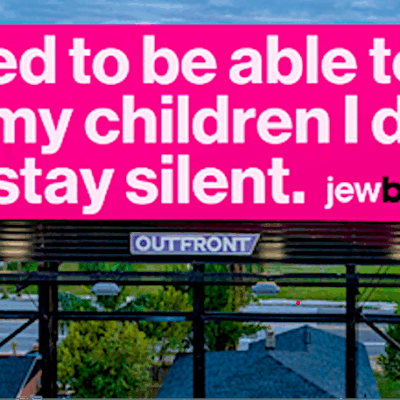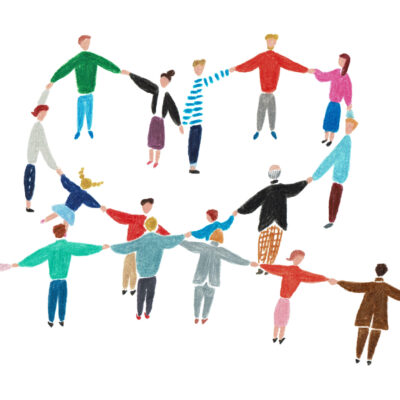Opinion
CARING FOR YOUR TEAM
Wellness in a time of trauma
In Short
Now more than ever, Jewish organizations should do their utmost to ensure their employees practice self-care.
Project Shema is a training and support organization built by progressives to help our Jewish community and allies understand and address contemporary antisemitism emerging from the far left. As you can imagine, these have been some of the most difficult weeks of our lives.
As a proudly progressive and Jewish organization, we know that there is no way to achieve our mission without a compassionate culture. In line with these values, we review our organizational values in detail at every quarterly meeting. We offer a generous wellness fund and encourage our employees to tap into it each month to regularly care for themselves; and we also offer flexible work hours, expansive PTO, floating holidays and mandatory vacations. We abide by a policy of full financial, salary and budget transparency. In short, accountability to and care for our employees is our sacred trust.
Luis Alvarez/Getty Images
But in a moment of crisis like this, caring for employees is more difficult and fraught than ever before. How do we balance our values of briyut (wellness) with hinenu (here we are), our obligation to be here for our community in a time of crisis? How do we honor our flexible work hours at a time when our team is working longer days than ever before? How do we allow our team the time and space to grieve when our organizational mission requires long hours of clarity and focus?
When the news of the attacks by Hamas first hit and we knew our team would soon be overworked and overwhelmed, we offered all of our employees reimbursement for an extra therapy session. The following week we offered another reimbursed therapy session and meal delivery for those who did not have time or capacity to prepare meals for themselves or their loved ones. On the Monday morning following the attack, we held two optional team processing calls to create a container for reflection and mourning. Every call we have had since the attack begins with a check-in before jumping into business.
Some of this is easy. Multiple times this week we have checked in on each other to make sure we’re all eating food and drinking water. We’re protecting one another from unnecessary meetings and we’re putting off lower-priority work while signaling to our partners to expect delays.
Some of this is harder. We must be OK with disappointing partners and clients right now. The idea of letting anyone down at this critical time has proved to be the most difficult part because our ability to meet those needs as a small but mighty team is limited, especially in a time of crisis. We are offering everyone on our staff additional support and flexibility to ensure each of us has the emotional resilience and psychological safety to do our work. We are also trying to make decisions about priorities and deadlines collaboratively, so we can take into consideration personal capacities.
Our team members’ personal and emotional wellness is a necessary precondition to doing our jobs. We cannot do the difficult work of pushing back against antisemitism and other bigotries if our team is not able to operate from a place of expansiveness, curiosity and compassion. These skills are tested, and often unavailable, in times of stress. We cannot engage others effectively if we are not taking care of ourselves first.
Nurturing a culture of self-care is difficult and daunting during a time of calamity, when Jews worldwide have experienced a near-universal collapse of psychological safety. But it’s more important now than ever.
Here are some tips on how you can support your team right now:
- Building a culture of self-care requires the buy-in and participation of leadership. If you encourage your employees to utilize wellness policies, leadership must demonstrate the importance of this by modeling and demonstrating that they are also human and capable of making self-care a priority. Our executive director takes device-free vacations and encourages us to do the same.
- All individuals in our field need extra grace in the days ahead. Trauma impacts everyone’s work and behavior, so we must shift our expectations to match the realities impacting our teams. Team members are finding that they are on the receiving end of more heightened emotional responses and we need to ensure that those on the receiving and giving end of those emotions are cared for and acknowledged, while still ensuring psychological safety in our workplaces. Grace does not include clear violations of workplace behavior.
- If your organization offers mental health benefits or services, re-share that information with your employees.
- Be conscious of the sensitive state in which so many of your employees find themselves. This means we must be more delicate with giving feedback and making requests of people’s time.
- Offer greater flexibility during the workday. Now more than ever, employees need opportunities to step away from work to nurture resilience.
Think about what additional resources you can offer your team. Do you have the financial capacity to support counseling or therapy for your employees? Are there meetings that can be made optional or shifted into spaces for processing or support? If you are demanding more time from your team, can you offer meal delivery/housekeeping services, or reimbursements for those who are not able to take the time to do this for themselves in moments of distress. Our model offers a set amount that may be used as our staff see fit. We are offering more this month.
There has never been a more important moment to practice self-care and live up to our community’s values of kavod habriyot, dignity for all human beings. Many of us know the final phrase of Hillel’s “If not now, when,” but those of us working in nonprofit and social justice spaces tend to lean into “If I am not for others, what am I?” and don’t always apply “If I am not for myself, who will be for me?”
April Powers is the director of diversity, equity, and inclusion and Zachary Schaffer is the co-founder and vice president of Project Shema.

 Add EJP on Google
Add EJP on Google









